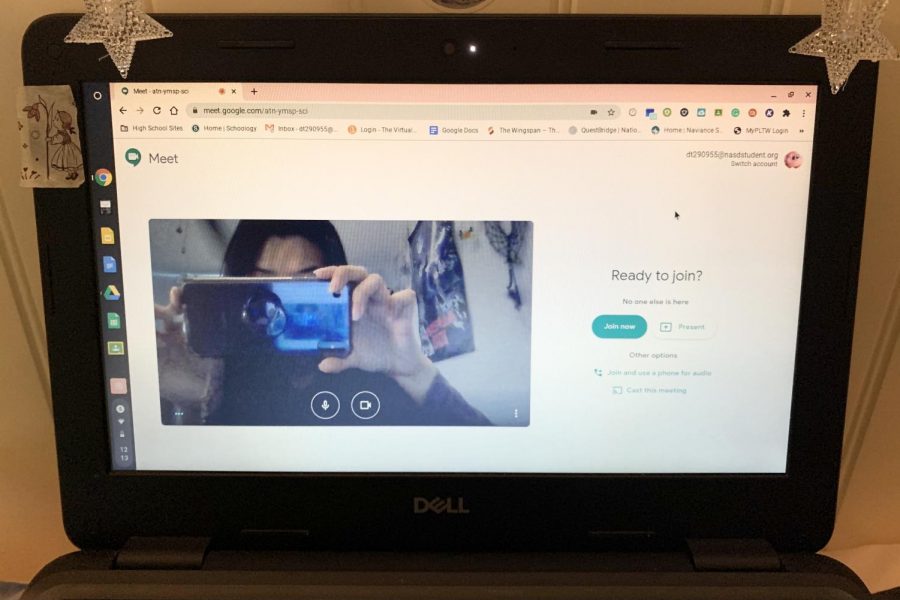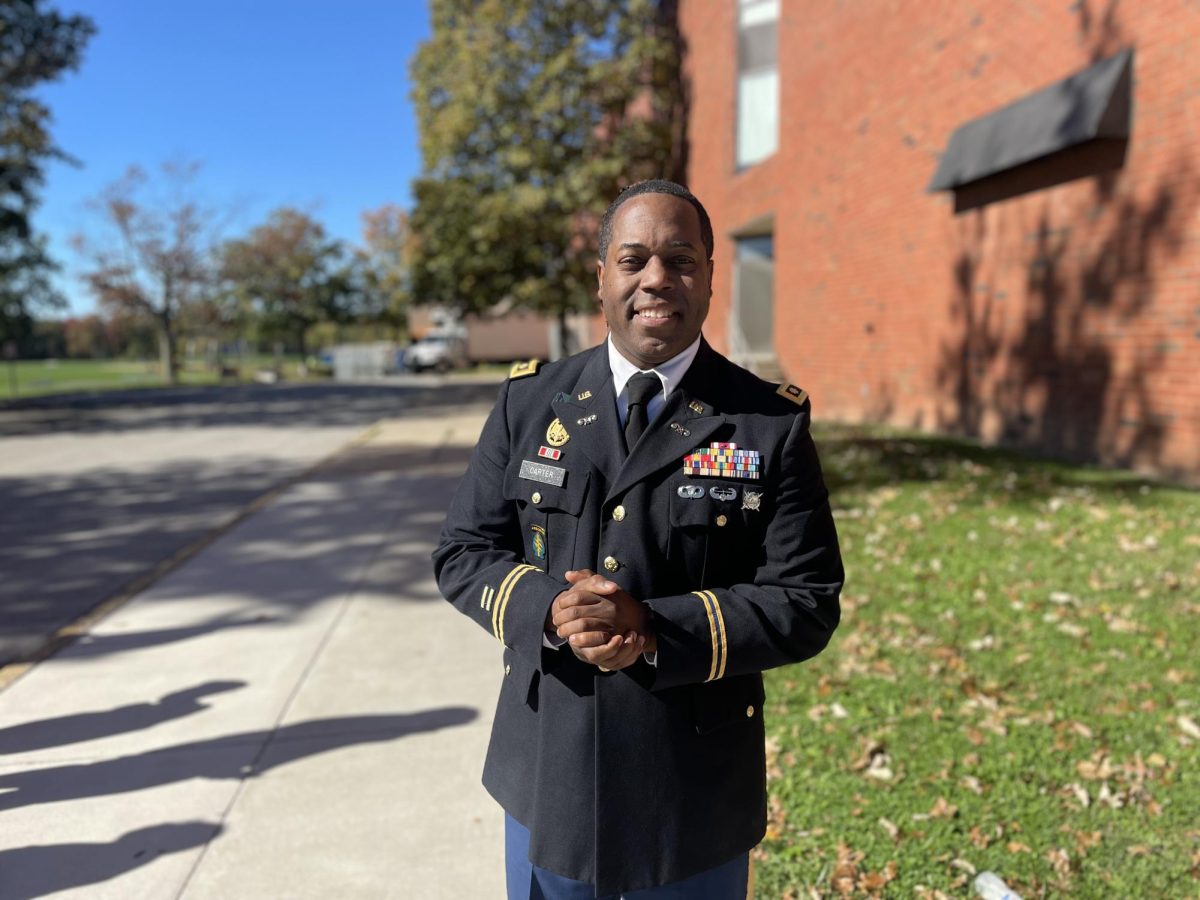Many Students Prefer ‘Cameras Off’ During Virtual Class
How has this little light become such a ray of controversy?
September 23, 2020
Waking up to bright screens instead of the sun, students are all slowly getting used to this new form school. Instead of waking up at 6 am or earlier, students are now getting extra time to sleep in. 7:30 am now has a different meaning: no more rushing up three flights of stairs or being trampled by a stampede of students, as a quick login is all you need. During the past three weeks, however, some issues have arisen, among them the debate over whether students should be keeping cameras on during classes.
In a typical classroom, the teacher is able to view their entire classroom, but when online, they are often limited to a screen full of avatars and first initials. Engagement, productivity, and simple presense in front of computer screens can all become issues when students have the option to turn their cameras off.
When asked whether or not students would willingly turn on their cameras after three weeks of online school, only three out of the 13 students I questioned preferred their cameras to be on.
Darian White, senior, is in favor of turning their camera on in class.“It makes me feel weird to be a faceless voice,” they said, expressing how they enjoy the engagement with their classmates. White doesn’t always keep their camera running– bathroom breaks, moving location, eating, etc.– but does prefer it normally.
“I find it a respect thing between the teacher and the student,” said senior Jessica Piccari. Piccari explained that when on camera, body language is easier to detect, so the teacher can know when a student is either interested or not in the subject.
Andrea Ritter, senior, explained, “I do turn on my camera for classes because I often miss the environment of the in-person classroom and long for human connection,” but she did add, “classes where I’m constantly forced to have it on adds an extra layer of stress. [I am] worried about how other people perceive me over the call.” Ritter’s response opens another door when it comes to teachers making students turn their cameras on.
On the other hand, out of the 13 students I spoke with directly, the majority (ten) would rather keep their cameras off during class time. Most of them spoke about the discomfort of having their cameras on, while others acknowledged that they didn’t want to look unpresentable on screen.
Shayla Spink, senior, expressed how she would much rather keep her camera off, as she lacks the motivation and energy to get ready as she would for a normal school day. “I personally don’t have an issue turning my camera on, but it’s not like school where we actually have to get ready,” she said. “I’m not going to get all ready to sit and look at a screen.”
Junior Gabby Garcia also prefers to keep her camera off but did acknowledge that she would keep her camera on only if it was mandatory. A freshman who prefers to remain anonymous fears keeping screens on can be a distraction to other students. “I easily get distracted by things around the living room,” she said. “I sometimes talk to my mom or fall asleep during classes.”
While many of the responses related to personal matters, Alison Creeden, senior, brought up a technical issue concerning her internet and the quality of the cameras. “I wouldn’t keep or turn my camera on because one, I feel insecure, and two, the quality she said. It pulls a lot from wifi to transmit the video feed, which makes my connection slow.”
When teachers expect students to turn their cameras on, many students would comply with the request, even if they preferred keeping their cameras off.
Senior Arianah McIntyre-Rankine acknowledged there are benefits to having a class full of faces. “I am not willing to turn my camera on, but if it’s mandatory, I don’t mind having my camera on. It does help me be more engaged though,” she said.
“For now, I prefer to keep my camera off,” said a sophomore who wished to stay anonymous. “However, I believe as time passes, I will begin to feel more comfortable with the other students and staff within my class.
Principal Edward Roth would prefer students to keep their cameras on, but he does hear students’ concerns. “We are not able to force anyone to turn their cameras on,” he said. Roth knows not every student feels comfortable having to keep their cameras on at all times as it can be perceived as an invasion of privacy. “We know it is a bit of a sensitive subject for some since you can be seen in others’ homes and others can see in your home.”
Roth did acknowledge that class would be more difficult if students continued to keep their cameras off in the long run as it doesn’t create the “in-class experience.”
“It’s not as much about keeping an eye on you as it is being able to see when you are confused, frustrated, excited, or have that ‘ah-ha!’ Moment.”
Although Roth doesn’t want the students to feel that their privacy is invaded, he stated concern for their education. “You will not fail if your camera is off. But I do think you are hurting your chances of earning the best grade possible,” said Roth. “With or without your camera on, if you log in but never do anything in the class it can count as an absence according to the state’s new rules for virtual attendance,” referring to the state’s guidelines on virtual learning.
Roth wants students to understand that they have a choice and are not forced to keep their cameras on, but he also hopes students will get more used to having their faces in front of a screen, as our return to school in January is still uncertain.
Considering it’s only been four weeks since the school year has started, there is still time for students to get comfortable in front of the screen; perhaps the ratio of students who keep their cameras off will steadily decrease as the year goes on.




Ms.Tello • Oct 21, 2020 at 6:48 am
Hi Duyen,
This was a beautifully written piece of writing.
I think you did a wonderful job of showing both sides to the camera on/off debate through the opinions of those you interviewed.
As a teacher, I can definitely see both sides of the story. We would love to have students turn their cameras on as it offers us a wider opportunity to figure out if students truly are understanding the material right then and there. However, I understand the challenges that students face when having the camera turned on. That means that I, as the teacher, should ensure that students’ assignments reflect an understanding of the current circumstances. Thank you for bringing light to this matter.
-Ms.Tello
Nakiah • Oct 1, 2020 at 8:38 am
I feel like students should have a choice of turning their cameras on and off
Nichole Mitchell • Sep 30, 2020 at 11:28 am
Yen, I really enjoyed reading this article. Kudos to you! -Ms. Mitch
Kirstin Colloton • Sep 24, 2020 at 10:51 am
Yen,
There are so many things I love about this article, including the correct use of [] within a quote! You’ve become such a strong writer and leader with The Wingspan and no quarantine-virtual environment can diminish that! – Ms. C